Keresés: %s
Keresés: %s
Official visit of Deputy Speaker of the Hungarian Parliament, H.E. István Hiller
The former Minister of Culture visited New York to discuss issues of Holocaust remembrance, education, and culture.
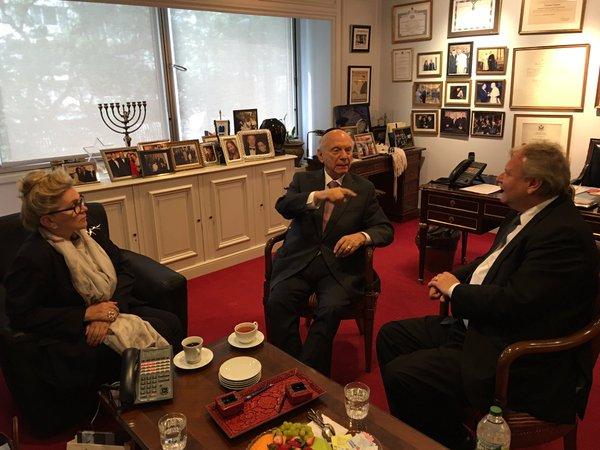
On his official visit to New York, Deputy Speaker Hiller met with rabbi Arthur Schneier and they discussed fight against antisemitism and the importance of education. They have worked together on the establishment of the Holocaust Documentation and Memorial Center in Budapest in 2002.
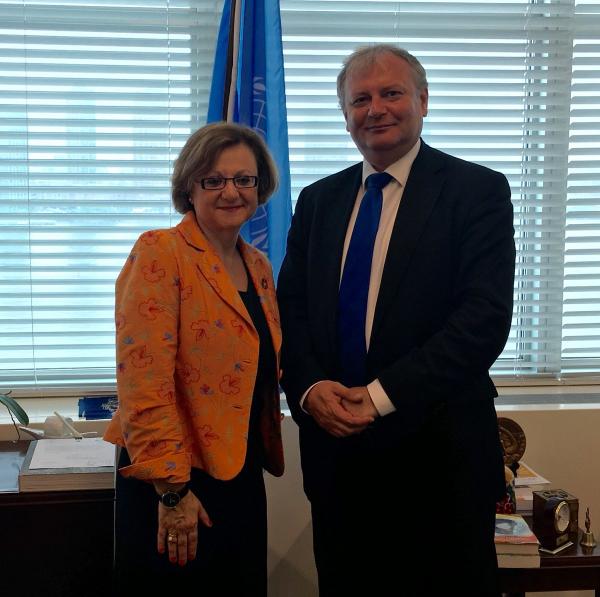
István Hiller discussed cultural cooperation with Cristina Gallach, Under-Secretary General for communication and public information. The Permanent Mission of Hungary to the UN has been working closely with the Department of Public Information on outreach, especially on Holocaust remembrance. On H.E. Ambassador Katalin Bogyay's initiative, Hungary was the co-organizer of the United Nations Holocaust Memorial Ceremony on the International Day of Commemoration in memory of the victims of the Holocaust, 27 January 2016.
Hungary proposing steps to improve fight against human trafficking in conflicts
As a follow-up to Security Council thematic debate on trafficking in persons in conflict situations held last December, the French Presidency of the Security Council decided to hold an Open Debate on “Women, Peace and Security: Responding to human trafficking in situations of conflict-related sexual violence” on 2 June 2016
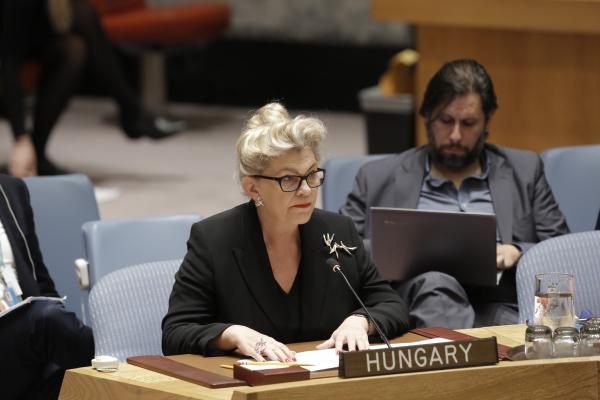
Ambassador Katalin Bogyay participated in the meeting and conveyed a strong Hungarian position, emphasizing first and foremost the importance of the need for a leading role of Member States in the fight against conflict-related sexual violence and human trafficking.
Recalling that the Security Council in its PRST adopted last December highlighted, in particular, the importance of the UN Convention Against Transnational Organized Crime and its Protocol to Prevent, Suppress and Punish Trafficking in Persons, Especially Women and Children, Ambassador Bogyay called for the effective implementation of the relevant international instruments essential.
The Ambassador furthermore echoed the long-standing position of Hungary for urgent efforts to prevent and protect women and girls who are impacted by conflict situations, stressing also the need for ensuring accountability of the perpetrators as well as meaningful participation of women in crisis prevention and resolution.
Hungary looks forward to the report currently being prepared by UNODC on the implementation of PRST 2015/25, which will be presented to the Council in December this year and is ready to participate in the discussions on how to strengthen UN response to this global threat.
To read the full speech of the Ambassador, please click here.
Hungarian President-designate for BWC RevCon visits New York to meet with the Secretary-General and others
Ambassador Dr. György Molnár of Hungary, President-Designate of the Eighth Review Conference of the Biological Weapons Convention has met with Secretary-General Ban Ki-moon, USG Kim Won-soo, High Representative for Disarmament Affairs and other UN disarmament officials. Amb. Molnár also met with Permanent Representatives of Member States in order to promote the universalization of the Biological Weapons Convention.
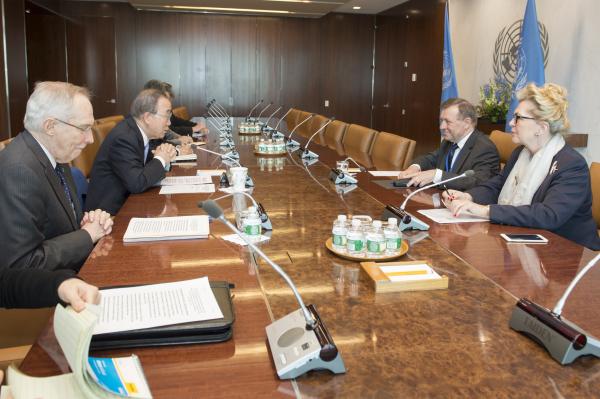
Amb. György Molnár, Special Representative of the Hungarian Minister of Foreign Affairs and Trade for Arms Control, Disarmament and Non-Proliferation, is wrapping up his visit to New York as President-Designate, which was part of his program to prepare for the Eight Review Conference of the Biological Weapons Convention (BWC) to be convened from 7 to 25 November, 2016 in Geneva.
The BWC, which is one of the fundamental pillars of the international community’s efforts to combat weapons of mass destruction, prohibits the development, production and stockpiling of biological and toxin weapons. It has 174 States Parties. Preparatory process for Review Conference began in Geneva in April, with many constructive proposals already on the table. The PrepCom will reconvene for one week in August to consider all provisions of the BWC.
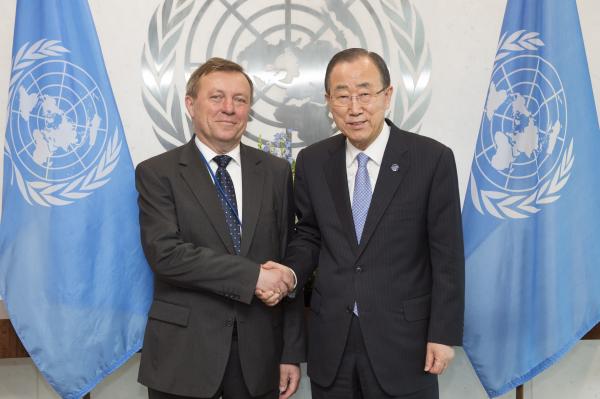
While in New York, Amb. Molnár, accompanied by H.E. Amb. Katalin Bogyay, Permanent representative of Hungary to the UN, has met Secretary-General Ban Ki-moon, USG Kim Won-soo to brief them on the preparations undertaken, and invite the Secretary-General to the Review Conference. As part of the outreach effort promoting the universalization of the Convention Amb. Molnár has also met the Representatives of Kiribati, Samoa, Tonga, Tuvalu and Vanuatu, UN Member States that do not have representations in Geneva.
Security Council reform – dawn of a new phase
Intergovernmental negotiations on Security Council reform quietly slipped into a new phase, with Member States commenting on the Chair’s new element paper on convergences concerning the first two main topics of Security Council reform. This brings the process one step closer to text based negotiations. In a first ever Polish-Hungarian Statement delivered by Ambassador Katalin Bogyay, the two countries suggested more elements, commented on the way forward and pushed for further meaningful discussions on all elements of Security Council reform.
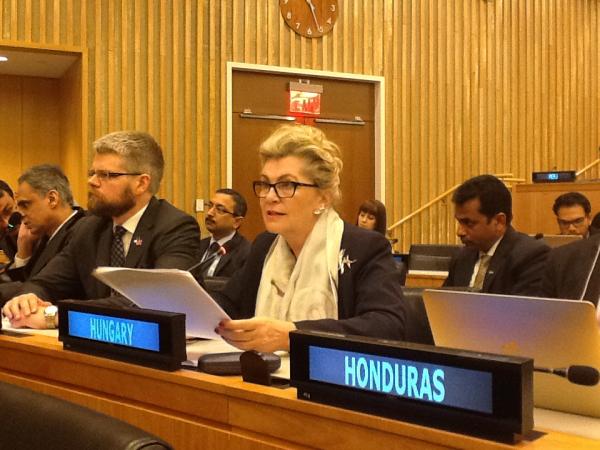
The first ever convergence paper of the Chair, on the cooperation between the Council and the General Assembly, and on the size and working methods of the Council, has received better than expected response from Member States. Countries are ready to work on the basis of the paper and request similar convergence document on the remaining three topics.
In her statement delivered also on behalf of Poland, H.E. Amb. Katalin Bogyay, Permanent Representative of Hungary expressed support for the logic and structure of the Chair’s document that bring the negotiations to a new level of abstraction. Ambassador Bogyay requested further elements to be included and suggested that besides convergences a consolidated list of alternatives is also needed to tackle thornier issues.
There is now an emergence of division of labor in the text with three hypothetical baskets emerging: One for Charter amendments; and one for recommendations that the General Assembly should make in a form of a GA resolution. The third is for the list issues that the new Council will have to decide, or work on. This gives Member States a better drafting basis then working in silos, along the lines of the five key elements.
To read the full statement of the Ambassador, please click here.
Plenary debate on the Security Council reform
H.E. Mr. Peter Thomson President of the 71st session of the UN General Assembly held a plenary debate to kick-off this years’ round of the Intergovernmental Negotiations (IGN) process on the Question of equitable representation on and increase in the membership of the Security Council. In her statement H.E. Katalin Bogyay permanent representative of Hungary explained our countries position concerning the Security Council reform and called for urgent action to make the most important decision making body of the UN more representative of the world it supposed to protect.
H.E. Katalin Bogyay permanent representative of Hungary to the UN like many other speakers stressed the urgent need for reforming the Security Council and to start text based negotiations in the IGN as soon as possible. Hungary is in favor of enlarging the Security Council in both the permanent and non-permanent membership categories, and underlines the legitimate request of the Group of Eastern European States for an additional seat in the non-permanent category. However enlargement cannot stand alone, it has to be accompanied by the review of working methods in order to make the Council’s work more effective and transparent. As a Member of the ACT (Accountability, Coherence and Transparency) Group Ambassador Bogyay invited countries that have not yet joined the ACT Code of Conduct which constitutes a voluntary pledge not to vote against Security Council resolutions aimed at preventing or ending atrocity crimes, to do so. Please find on the right the statements made by Ambassador Katalin Bogyay.
Minister of State Istvan Mikola's statement at the World Humanitarian Summit
Statement by H. E. Mr. Istvan Mikola, Minister of State for Security Policy and International Cooperation of Hungary at the Member States and Stakeholders Announcements of the World Humanitarian Summit (WHS), Istanbul, 23 May 2016.
Hungary's Foreign Minister talks to Forbes Magazine On China, NATO Expansion, And Refugees As Weapons
Péter Szijjártó, Minister of Foreign Affairs and Trade of Hungary, gave a statement on the “High Level Thematic Debate On The U.N., Peace, and Security,” on May 9 2016. In the speech he identified a “new world order” and called on the United Nations to increase its role from peacekeeping to “preventing the outbreak of new wars and military conflicts.” Anders Corr interviewed him at the U.N. building just before the speech.
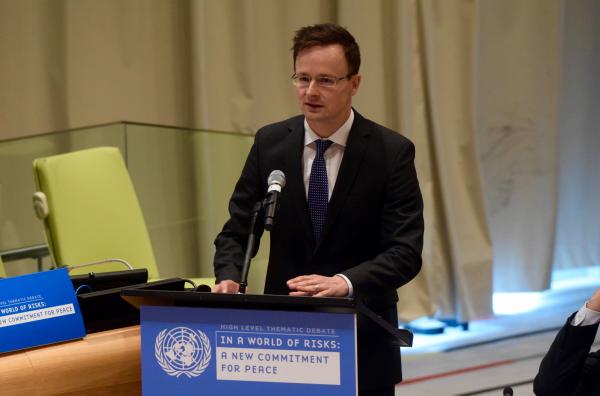
Water Connects – Budapest Water Summit 2016
From 28 to 30 November 2016 the Government of Hungary, in cooperation with the World Water Council, successfully organized the Budapest Water Summit 2016 to give momentum to the implementation of the Sustainable Development Goals (SDGs) related to water.
During the three-day conference Heads of State and Government, Ministers, high-level representatives of international organizations, business, the scientific community and civil society have gathered in Budapest, Hungary to promote the practical implementation of water-related objectives in the SDGs and the Paris Agreement. The event provided an opportunity to highlight that water connects, it does not divide.
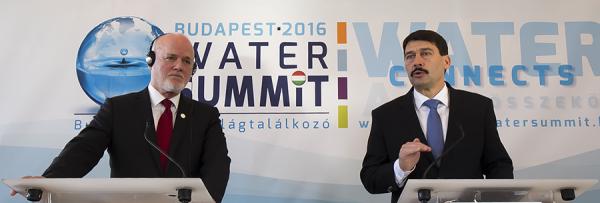
The Summit, organized as a platform to link political decision-makers with technology, financing and public support for promoting the practical implementation of water-related objectives in the SDGs and the Paris Agreement on climate change, received around 1800 participants and 600 Sustainable Water Solutions Expo visitors from 117 countries. The BWS 2016 provided platform for discussion for high-level representatives of governments, international organizations, members of the scientific, business and financial sectors and representatives of civil society from all over the world.
Seven high-level panel discussions took place during the Summit, including a special session on water in the context of climate change. The sessions featured members of the High-Level Panel on Water, a joint UN-World Bank initiative launched in January 2016 with the support and membership of country leaders who are working to mobilize support for implementation of global water goals.
Several events took place in parallel to the plenary sessions, including a Sustainable Water Solutions Expo, a Science-Technology Forum, a Youth Forum, a Civil Forum, as well as a Women’s Forum with the participation of H.E. Ambassador Katalin Bogyay, Permanent Representative of Hungary to the UN as a panelist.
In his opening address, János Áder, President of Hungary, identified water as the most significant issue of the 21st century. UN General Assembly President Peter Thomson, World Bank managing director Joaquim Levy and the Heads of State of Bangladesh, Mauritius and Tajikistan addressed delegates at the opening, and messages were conveyed from UN Secretary-General Ban Ki-moon, Archbishop of Constantinople Bartholomew I and Pope Francis.
The Summit once again highlighted the centrality of water in fulfilling a transformative agenda for sustainable development, building prosperity and human well-being. This milestone event in the global water agenda successfully promoted the message that for all the countries helping sustainable water resources development should be the source of cooperation and of peace.
To learn more about the BWS please visit: http://www.budapestwatersummit.hu/
To read the Summit’s closing document, the Budapest Water Summit 2016 Messages and the Policy Recommendations, go to: http://www.budapestwatersummit.hu/budapest-water-summit/budapest-statement/budapest-statement-2016-780/
The Hungarian Minister of Foreign Affairs and Trade stresses the need for prevention in his statement to the High-Level Thematic Debate on Peace and Security
In his statement to the High-Level Thematic Debate on Peace and Security organized by the President of the General Assembly, the Hungarian Minister of Foreign Affairs and Trade, Mr. Péter Szijjártó stressed the importance of prevention in sustaining peace. He said that the greatest threat today is posed by the growing network of terrorist organisations and underlined that security and sustainable development go hand in hand in the long run.

The Hungarian Minister of Foreign Affairs and Trade, Mr. Péter Szijjártó participated to the High-Level Thematic Debate on Peace and Security organized by the President of the General Assembly on 10-11 May 2016.
In his speech, the Minister of Foreign Affairs and Trade spoke about the fundamental changes that are shaping the world and because of which the global security situation has also changed. Hungary fully supports the current three major reform processes of the UN that cover the areas of peacekeeping, peacebuilding and the women, peace and security agenda and believes that a greater emphasis should be put on preventing conflicts in the first place.
According to the Minister of Foreign Affairs and Trade the greatest threat today is posed by the growing network of terrorist organisations that are paralyzing numerous countries and force thousands of people to either live under their threat or flee their countries. The Minister stressed that Hungary is actively supporting the international counter-measures against Daesh and he also stressed how terrorists are exploiting the human migratory waves heading to Europe. Mr. Szijjártó also highlighted that “security and sustainable development go hand in hand, and so beneficiary countries should be required to apply funding in such a way that those resources contribute to eliminating the reasons that are forcing people to flee”.
The Hungarian Minister of Foreign Affairs and Trade also attended ain informal ministerial lunch organized by the President of the General Assembly where the participants discussed the challenges that the new Secretary-General will have to tackle.
Hungary’s participation at charity event: UN International Bazaar 2016
Almost 80 Permanent Missions offered colorful fine arts and handicrafts products as well as a variety of delicious culinary masterpieces at this years’ UN International Bazaar, a very successful charity event that took place on Wednesday, 4th May at the UN Plaza. Just like last year, the Permanent Mission of Hungary participated with a national merchandize stand at the event organized under the patronage of Mrs. Ban Soon-taek, wife of UN Secretary General and contributed this way to the important fundraising work to help Syrian refugees and children projects around the world.
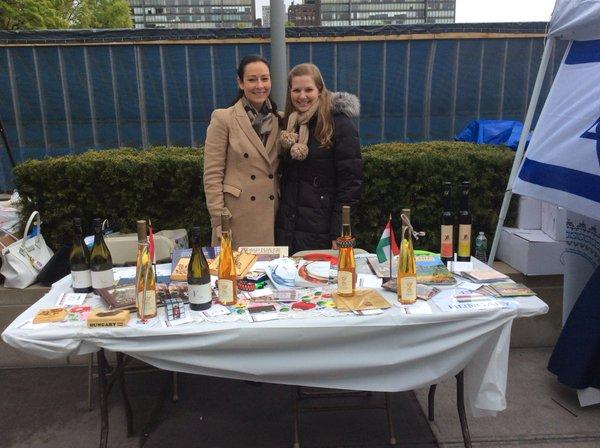
On a historic day 172 countries sign the Paris Climate Agreement
On 22 April 172 countries signed the Climate Agreement adopted in Paris by the 196 Parties to the UN Framework Convention on Climate Change (UNFCCC) at a conference known as (COP21) last December.
At the signature ceremony H.E. Mr. János Áder, President of Hungary called for keeping the momentum and steadfast progress towards implementation.
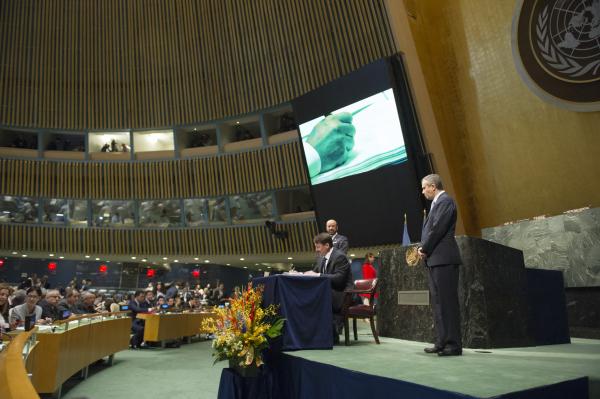
The next critical step for international community is to ensure that the landmark Agreement, which commits to limit global temperature rise to well below 2 degrees Celsius, and to strive for 1.5 degrees Celsius, enters into force as soon as possible. It will enter into force 30 days after at least 55 countries, accounting for 55 per cent of global greenhouse gas emissions, deposit their instruments of ratification.
In his statement, President Áder underscored the need to keep the momentum gained in Paris, and achieved in New York at the signature ceremony to accelerate progress towards implementation. To this end, the President of Hungary has made three proposals. He appealed to the 10 biggest emitters to start consultations at the earliest to reduce their emissions at a faster pace than agreed. The President appealed for finishing negotiations on the aviation related emissions and for starting negotiations on shipping related emissions at the earliest, to address areas the Paris Agreement did not cover. President Áder also proposed that the G20 countries, with the support of OECD accelerate research into finding as soon as possible efficient, safe, cost effective and sustainable forms of energy storage.
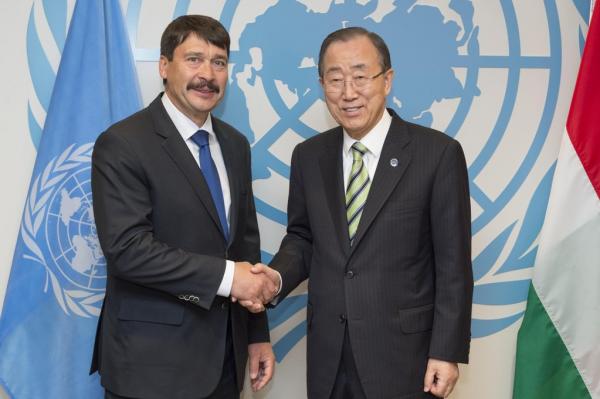
On the same day, President Áder also had bilateral meetings with UN Secretary-General Ban Ki-moon and Al Gore, former Vice President of the United States of America to discuss SDG implementation and climate action.
10 Heads of State and Government join forces to mobilize global support to implement SDG6 on water
On 21 April, United Nations Secretary-General Ban Ki-moon and World Bank Group President Jim Yong Kim formally announced the appointment of 10 Heads of State and Government, as well as two Special Advisors, to the High-Level Panel on Water.
H.E. Mr. János Áder, President of Hungary also joined the international coalition of Heads of State and Government with the aim to mobilize global support to implement Sustainable Development Goals 6 (SDG6): “Ensure availability and sustainable management of water and sanitation for all”, and targets related to water contained in the 2030 Agenda.
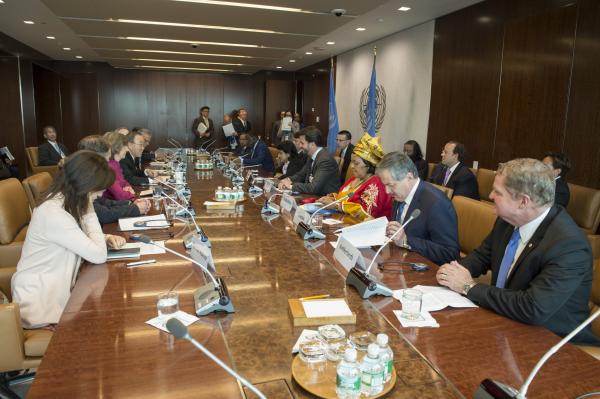
The High-level Panel on Water held its inaugural meeting on 21 April in New York, on the margins of the High-Level Thematic Debate on Achieving the Sustainable Development Goals.
The Panel will provide the leadership required to tackle these challenges and champion a comprehensive, inclusive and collaborative way of developing and managing water resources, and providing improved access to clean water and sanitation.
On the occasion of the first meeting of the panel, President János Áder of Hungary underlined that water is the most critical natural resource of the 21st century. Our development, the wellbeing, food, health and peace of our children will depend on how quickly we shift for a sustainable pathway of managing our water resources. We see the goals, but the road of transformation still needs to be charted. We are racing against the time but also against the consequences of our habits and earlier practices.
To find out more on the panel and to access the joint statement of its members, click here.
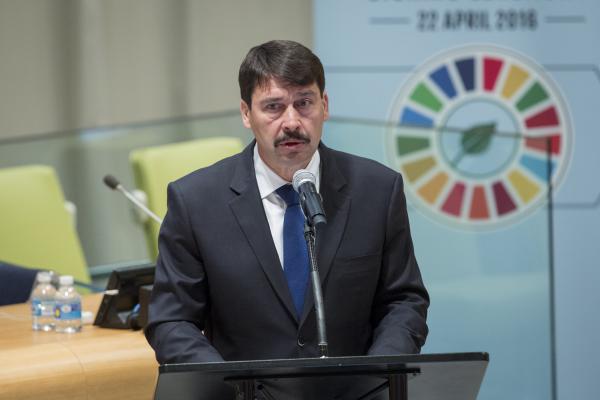
At the High-Level Thematic Debate on Achieving the SDGs, President Áder underlined that the timely implementation of SDG6 on water is a cornerstone of realizing sustainable development. Being committed to continue the active role undertaken in designing the SDGs as co-chair of the Open Working Group, Hungary is turning towards implementation. In this spirit, Hungary will host the Budapest Water Summit 2016 in late November, building on the successes of the first Budapest Water Summit held in 2013.
The same day, President Áder had bilateral meetings with Croatian President Kolinda Grabar-Kitarović, President of Mauritius Ameenah Gurib, co-chair of the High-Level Panel on Water and UN Special Envoy for Disaster Risk Reduction and Water Dr. Han Seung-soo, Special Adviser of the Panel.
Intervention by Ambassador Bogyay on Water, Peace and Security
Intervention by H.E. Ambassador Katalin Annamária Bogyay Permanent Representative at the Open debate of the Security Council on Water, Peace and Security, 22 November 2016
Your Excellency, Mr. President, Honorable members of the Security Council, Dear Colleagues,
Let me first commend the Senegalese Presidency for including this topic on the agenda of the Security Council.
Hungary aligns itself with the statement delivered by the European Union.
When speaking about water security and cooperation I always refer to the striking conclusion of a Hungarian-born Nobel laureate physicist (Dénes Gábor): “Until today man has fought nature. From now on man has tofight his own nature.”
What makes this statement relevant in the context of this debate is that the challenges related to the sustainable management of our freshwater resources, as well as the looming water crisis, are up to a large extent man-made. Mutual dependencies will only increase over time as regions and sectors exposed to water shortage rely more and more on waters controlled by others, also due to the dramatically changing climatic conditions and the excessive growth in global population. All these ever increasing challenges contribute to the growing water scarcity and exacerbate the situation arising from the unequal geographical distribution of the water resources.
But while many consider water as a driver of conflict, water is also, and perhaps even more importantly, a source of cooperation. While over 140 water-related treaties were signed in this century, datasets show that only seven minor skirmishes related to water are found in the same period. War over water is neither strategically rational, nor hydrographically effective, or economically viable. Until today, water cooperation has prevailed over water conflicts.
But in order to prevent water to become one of the main causes of tomorrow’s conflicts, or a tool for certain methods of war, significant changes will be needed in the way we manage our waters. Water is the most critical natural resource of the 21st century; therefore it must be treated as a high priority. The growing uncertainties can only be tackled successfully if all Member States, as well as all stakeholders act together. Cooperation across geographical and political boundaries will be of key importance for stability and survivability for more than 40% of human lives on shared waters.
Water diplomacy is a key priority for our country. Hungary has also developed a strong tradition of prudent water management over the centuries, while also providing technical assistance to developing nations. Given the hydrogeological conditions of the country, transboundary water cooperation is an unquestionable imperative for Hungary. We also encourage all Member States to join the relevant UN Conventions on water. To avoid mismanagement, distrust and eventually conflict, the establishment of coordination mechanisms sharing countries at the level of transboundary river basins or aquifers is an absolute must. Transboundary cooperation hinges on political will and on the understanding of what the issues are. Data sharing over transboundary river basins and/or aquifers is therefore essential.
The Budapest World Science Forum, organized by the Hungarian Academy of Sciences and UNESCO since 2003 has put water cooperation into the forefront of its deliberations.
The 2030 Agenda for Sustainable Development once again reconfirmed that sustainable development and peace are interlinked. Universal implementation of this Agenda will reduce tensions among countries, and will ensure that situations, threatening international peace and security, arise less frequently.
Under the patronage of H.E. Mr. János Áder, President of Hungary and Member of the Joint UN and World Bank High Level Panel on Water, Hungary is hosting next week, from 28 to 30 November 2016, the Budapest Water Summit 2016, to give momentum to the implementation of the water-related agenda transpiring from SDGs and the Paris Climate Agreement. The mission of the Summit is to promote the message that for all the countries helping sustainable water resources development should be the source of cooperation and of peace.
The 2030 Agenda creates an impetus for all Member States and UN organs to work together, without changing the authority of any organ as set forth in the Charter. With the adoption of the SDG framework and its integrated vision on water, we now have clear pathways towards placing water into the center of our collective development efforts. Delivering on the water related goals and targets of the 2030 Agenda will, by definition, enhance water cooperation, and reduce tensions connected to water. An enhanced cooperation under the development pillar of the United Nations would also bring to the forefront the very simple truth that water connects, it does not divide.
Thank you for your attention.
Speech by Ambassador Bogyay at the United Nations Day Gala Concert
It was a great honour for the Permanent Mission of Hungary to the UN to co-host and sponsor the United Nations Day Gala Concert on Monday, 24th October, 2016. Find below the speech delivered by H.E. Ambassador Katalin Annamária Bogyay, Permanent Representative of Hungary to the United Nations on this special occasion.
Secretary General and Mme Ban,
President of the General Assembly and Mrs Thomson,
Undersecretary General, dear Cristina Gallach,
Vice Minister of Foreign Affairs and Trade of Hungary, Mr Szabo and Mrs Szabo,
Your Excellencies, Dear Friends, Dear Guests,
UN Day gala concerts celebrate and reflect the work of the United Nations through the universal language of music. It is a great honour for the Permanent Mission of Hungary to co-host the UN Day Gala Concert in 2016.
In the practice of international relations, it is common to look at the world as divided into the developed and developing, democratic and democratizing, rich and poor, North and South. Putting countries into distinct and simple categories serves as a conceptual tool for academicians and politicians alike. But it also obstructs our vision of the true diversity of humanity, and prevents us from understanding the shared values that make us one human family.
As 13th century Persian poet and Islamic scholar, Jalal al-Din Rumi writes:
“Half of me comes from here, half from everywhere.
Half of me comes from the pearls of the sea, half from distant shores.”
I will invite you all to a musical journey tonight which will prove by the end how interconnected we all are.
“Freedom first”
The theme of tonight’s concert is Freedom first.Universal aspiration for fundamental freedoms and human rights which are also enshrined in the UN Charter is one of the main purposes of the Organization. We, Hungarians deeply cherish freedom and independence having been forced to fight for these so many times throughout our history. At the same time, we highly believe in international cooperation and unity to ensure that everyone enjoys these universal principals and rights.
Tonight we remember through musical pieces the heroes all over the world who devoted their lives to fighting for fundamental freedoms, or who had to leave their countries because of political persecution.
As one of the heroes of FREEDOM FIRST, Nelson Mandela writes in his book: Long Walk to Freedom
“I have discovered the secret that after climbing a great hill, one only finds that there are many more hills to climb…”
This we all have to always remember!
In the first part of the concert you will hear pieces about love torn apart by persecution, love destroyed by foreign occupiers, and love for freedom, a march against oppression. In our musical journey you will meet the musicians, dancers, artists of the Hungarian State Opera, which was opened in 1884.
Actually its orchestra, The Budapest Philharmonic Orchestra, is Hungary’s oldest functioning orchestra, looking back on a past of more than a century and a half. Its first concert was given in 1853, under the baton of Ferenc Erkel, who went onto conduct the orchestra’s next sixty concerts.
The greatest Hungarian composers like Erkel, Liszt, Goldmark, Dohnányi, Bartók, Kodály, Weiner, wrote many pieces for the orchestra, and world renowned composers – such as Brahms, Dvořák, Mahler, Mascagni, Prokofiev, Ravel, Respighi, Richard Strauss and Stravinsky also frequently introduced their works with the Philharmonic Orchestra .
“Only from the clear Spring”
We, Hungarians have always tried to preserve our own culture, yet were forced to absorb other cultural influences because of our history and geographical position in Europe. In the end, I feel this cross-fertilization with others has proved to be our strength. It has enabled us to be bold and creative like a great Hungarian 19th century musician, Ferenc/Franz Liszt who, recognized that he had developed his creativity through his contact with the world at large and that his music was at the service of all humankind.
Throughout his career he travelled more widely than any musician of his time and in his final years wrote:” My only remaining ambition as a musician is to hurdle my lace into the boundless realm of the future.”
In the coming segment of our program we are listening to the dialogues of musicians coming from different parts of the world.
This dialogue is based on Béla Bartók message:
“My guiding philosophy has always been the idea of different nations uniting into brotherhood, in spite of all the wars and hostility. I have tried to serve the aims of this idea, as best as I can, in my music! So for that reason I do not shrink away from any influence … no matter the source, as long as it is pure, natural and vital.”
I have invited artists from countries which played a very supportive role here in the United Nations towards my country 60 years ago. Those countries were members of the United Nations General Assembly special committee on Hungary. I am grateful to my fellow ambassadors and permanent missions of Denmark, Sri Lanka, Australia collaborating with us in tonight’s program.
“Diversity: a source of inspiration”
I see our world as a global cultural space, a multi-layered treasure, a magic box full of undiscovered jewels. The process of inspiration followed by the creativity of people working together, is, to me the most beautiful aspect of this varied cultural space. For a culture to open its doors wide, it must believe in its own strength, knowing that it is rich enough to nourish other culture, yet sensitive enough to benefit from foreign influences. Hungarian culture has always been open, welcoming at the same time strong enough to inspire other cultures.
Diversity is not a burden but a source of inspiration!
As Mahatma Gandhi said:
“No culture can live if it attempts to be exclusive.”
Let us celebrate the power of inspiration, joie de vivre, with Brahms, Johann Strauss and Kodaly in our last segment of the UN -Day Gala. Here I would like to thank Maestro Gerard Schwarz, legendary American conductor who was a real inspiration to create the musical programme of tonight.
Ladies and Gentlemen,
Sixty years ago, H.E. Mr. Ban Ki-moon, Secretary General was a sixth grader in rural Korea. It was 1956, and people in Hungary were facing a violent suppression of their aspirations. He wondered: “What could we do? How could we best express support from our far-off corner of the world?”
Then it came to him, “We will write to Dag Hammarskjöld!”
As the student chair, H.E. Ban Ki-moon wrote a letter to the Secretary General of the United Nations.
“Dear Mr. Secretary General, “help the people of Hungary so they can have freedom and democracy.”
On the UN Day Gala we would like to thank you for this letter and your service in fighting for peace, freedom, security, development and human rights in all over the world!
Remarks by Ambassador Bogyay at the Appointment Ceremony of Ms. Nadia Murad Basee Taha
Remarks by H.E. Ambassador Katalin Bogyay Permanent Representative at the Appointment Ceremony of Ms. Nadia Murad Basee Taha As Goodwill Ambassador for the Dignity of Survivors of Human Trafficking on 16 September 2016.
Ms. Murad,
Last December I had the chance to talk to you in person when you told me horrific details of your personal drama. Thank you for your bravery for sharing it with the world. I know that thousands of victims feel stronger because of your tireless advocacy, because of your voice!
I remember you mentioned me that you cut your hair short so that those monsters would not so much fancy you. I am so happy to welcome you here in the UN again with your beautiful, long hair and I salute you from the bottom of my heart. We admire your strength and courage to step up against the evil of Da’esh , its brutality and for the sake of the victims of modern slavery.
I would like to thank UNODC for this important initiative, and to use this opportunity to applaud Mme. Amal Clooney for providing legal assistance to bringing Da’esh to justice.
Your presence Mme, here and work worldwide actually symbolizes our firm commitment that the international community must do everything to ensure that the perpetrators of these horrific crimes are held to account. In this context, Hungary is ready to join the global campaign initiated by UK and Belgium to bring Da’esh to justice and we encourage others to do the same.
Ladies and Gentlemen,
Today the expansion of violent extremism and terrorism pose the greatest challenges to our world. In addition to committing mass killings, destroying cultural heritage, and carrying out other brutalities, ISIL and other terrorist organizations have institutionalized slavery and sexual violence to facilitate recruitment by promising male fighters access to women, to generate revenue, to terrorize local communities, or to displace inhabitants from strategic territories. A historically well-known tactic in the 21st century!
Religious and ethnic cleansing is an ancient crime. The systematic targeting of Yazidis, Christians, and other religious and ethnic minorities threatens not only peace and security but also the mere existence of these communities. Hungary is of the view that the preservation of the region’s multi-religious, multi-ethnic and multi-confessional character is of utmost importance also for ensuring peace and security in the long term.
Slavery is a crime that violates the most fundamental human rights of its victims. It steals the most precious values of human beings: their freedom and dignity. We must concentrate on helping the victims and listening to their needs.
Raising awareness of the magnitude of the problem is crucial. Although the prohibition of slavery is one of the strongest norms, only a few people know that there are more people in slavery today than at any time in human history. According to recent estimates, between 20.9 and 45.8 million people are enslaved across the globe. This is also the reason why we encourage the next Secretary-General of the UN to make combatting slavery and human trafficking one of the key areas of focus.
Thank you for your attention.
Intervention by Ambassador Bogyay on the issue of Sexual Exploitation and Abuse
Intervention by H.E. Ambassador Katalin Annamária Bogyay Permanent Representative of Hungary to the UN, on 7 September 2016 at the Formal meeting of the General Assembly on the issue of Sexual exploitation and abuse under agenda item 122.
Mr. President,
Excellencies, Dear Colleagues,
I wish to thank Egypt and Brazil, Bangladesh, China, Ethiopia, India, Jordan, Morocco, Nigeria, Pakistan and Rwanda for initiating this meeting in the General Assembly. Hungary strongly supports to have discussions in this topic with all Member States, and especially with the troop and police contributing countries.
Hungary fully aligns itself with the statement delivered (/to be delivered) by the European Union.
Hungary fully shares the view that the international community must not tolerate sexual violence, whatever its expression and wherever it takes place. We believe that by uniting our efforts, we can definitely combat the phenomenon of sexual violence in conflict situations, emergencies and humanitarian crises.
Hungary declared its commitment to the cause of preventing sexual violence at the Global Summit to End Sexual Violence in Conflict. In addition, we reconfirmed our commitment by issuing national pledges at the Security Council Open Debate on Women, Peace and Security held in October 2015.
Sexual violence committed by peacekeepers needs even more attention from the international community. Let me express our strong concerns about the serious and continuous allegations of sexual exploitation and abuse by United Nations peacekeepers. These acts are unacceptable under any circumstances, and all measures have to be taken against them. Hungary fully supports the United Nations zero tolerance policy on all forms of SEA.
Furthermore, we should never forget that the goal of the zero tolerance policy is to have zero cases, as it is often said that one case is too many. In our point of view in order to achieve this goal we need to focus on three pillars of actions: (1) on prevention of these acts, (2) on discovering and investigating these cases and then (3) on accountability of all perpetrators.
From our perspective it is more than evident that the most important is to have very solid measures to prevent sexual exploitation and abuse. It is our common responsibility to ensure that all troops, police and civilians in missions meet the highest standards of behavior. All troop and police contributing country need to provide appropriate pre-deployment and in mission training on conduct and discipline, and the UN has a vital role to facilitate troop and police contributing countries to fulfill these requirements.
Hungary is committed to the efforts of the international community aimed at the full implementation of UN Security Resolution 1325 on „Women, peace and security” and the subsequent resolutions on this topic. We are sure that empowerment of women in peacekeeping missions is an essential tool to address sexual and gender-based violence and can make positive contributions to prevention of such crimes in the future. Therefore we would like to see more official women peacekeepers and women peacemakers strengthening and helping communication in the field.
Once these unforgivably cases happened, they have to be revealed and properly investigated, otherwise remedial actions cannot be taken, and victims would lack the necessary support. Investigations are also prerequisite to bring perpetrators to justice. When it comes to accountability, we must not forget that the primary responsibility lies with States. In this regard, States should make efforts to build the necessary capacities, train their investigation officers, prosecutors and judges to effectively investigate crimes and carry out criminal procedures, with special regard to the sensitivities and the particular nature of crimes involving sexual violence.
We firmly believe that these crimes must be prosecuted and punished. We strongly support the policy of zero impunity for perpetrators, ensuring accountability of either military, police or civilian personnel. As a last resort Security Council resolution 2272 (2016) also contributes to bring justice to victims.
We cannot fail to abolish these crimes. We cannot let the actions of a few erode the heroic work of thousands of UN peacekeepers. It is now imperative that the international community lives up to its political commitment by concrete and measurable actions.
Excellencies, dear Colleagues,
Last, but not least let me commend the efforts of UN peacekeepers to bring peace in conflict areas risking their lives so many times and whose tireless work are shaded because of actions of a minority.
Thank you, Mr. President.
Intervention by Ambassador Bogyay on the Report of the Secretary-General entitled “Mobilizing collective action: The next decade of the responsibility to protect”
Intervention by H.E. Ambassador Katalin Bogyay Permanent Representative on 6 September 2016 at the General Assembly Informal Interactive Dialogue on the Report of the Secretary-General entitled “Mobilizing collective action: The next decade of the responsibility to protect”.
Mr. President, We thank the Secretary-General for his forward-looking 8th report, which provides a clear and realistic view of the challenges Member States, the United Nations and regional organizations have to face while implementing the principle of the responsibility to protect.
Hungary welcomes the appointment of Mr. Ivan Šimonović as Special Adviser on the Responsibility to Protect and looks forward to working with him in the coming years ahead.
We believe that with strengthened political will of Member States and better use of already existing tools, the international community could effectively prevent and end mass atrocities.
We share the view that early warning plays an important role in preventing atrocity crimes and is the basis of early action.
As regards the question of the use of force, we consider that as a first priority, peaceful measures should be taken to prevent atrocity crimes. The use of force should remain a last resort, which should only be used in case authorization is given by the Security Council.
The root causes that may give rise to these heinous crimes are manifold, and so are the solutions. Therefore, integrated action is needed that is based on core values, and that places particular emphasis on:
· the respect for human rights and international humanitarian law; and
· ending impunity of the perpetrators of atrocity crimes, based on the sharing of burden between international courts and tribunals and national judicial mechanisms, taking note that national systems have the primary responsibility, and also respecting the principle of complementarity with respect to the ICC.
We also share the view that all relevant international actors – including states, regional organizations and the UN – can and should contribute to the operationalization of the R2P, especially through sharing information and best practices and coordinating their responses. Potential actions shall include:
· the consideration of restraint from the use of veto by the permanent members of the Security Council in situations involving atrocity crimes;
· making use of alternative mechanisms (i.e. peaceful tools such as fact-finding and monitoring missions, commissions of inquiry) to protect populations; and
· working closely with and supporting humanitarian organizations, as they have expertise and experience in early-warning, prevention and accountability.
In 2008, Hungary launched the Budapest Human Rights Forum, a series of annual international human rights conferences attended by national and international human rights experts, representatives of governments, international organizations and NGOs. This year in November, Hungary will organize the 9th Budapest Human Rights Forum where one of the panels will focus on the human rights aspects of the prevention of mass atrocities and the responsibility to protect.
On international level, Hungary – as an active member of the ACT Group – supports the efforts aimed at making the Security Council more accountable, transparent and thus legitimate. We also advocate for timely and decisive action by the Council when it is necessary to prevent or end the commission of genocide, crimes against humanity and war crimes. I would like to use this opportunity to encourage all Member States who have not yet done so to join the Code of Conduct elaborated by the ACT Group and already supported by 112 Member States.
Hungary is a proud member of the Group of Friends of the R2P and the R2P Core Group in Geneva. We recognize the crucial role that Geneva-based organizations play in highlighting the importance of preventing mass atrocity crimes through capacity building and early warning and strengthening accountable and inclusive national institutions. Together with other members of these groups, we seek to strengthen cooperation on existing prevention mechanisms between the UN institutions in New York and Geneva. The Core Group in Geneva will continue to decide on R2P-specific initiatives in the Human Rights Council.
As a best practice, Hungary would like to draw attention on the activities of the Budapest Centre for the International Prevention of Genocide and Mass Atrocities – established in 2010 – which makes an important contribution on both international and regional level to the efforts of implementing R2P. In March 2015, the Centre launched an 18-month initiative, the “African Task Force to Prevent Mass Atrocities” to map the State of the Art of preventive capacities in Africa by exploring opportunities and challenges faced by five regional organizations (AU, ECOWAS, IGAD, SADC, ICGLR). The Task Force provided opportunities to exchange views on best practices, challenges and identify context-specific needs while elaborating on feasible policy recommendations to be included in a Final Report released in autumn 2016.
I thank you, Mr. President!
Intervention by Ambassador Bogyay on the working methods of the Security Council
Intervention by H.E. Ambassador Katalin Bogyay Permanent Representative at the Security Council open debate on the working methods of the Security Council under the agenda item “Implementation of the note by the President of the Security Council (S/2010/507)” on 19 July 2016.
Your Excellency, Mr. President,
Honorable members of the Security Council, Dear Colleagues,
I thank Japan for providing us the opportunity to reflect on this important topic.
We all would love to see a more efficient, transparent, relevant Security Council, which can provide solutions and not cul-de-sacs. In order to join forces in trying to find ways and means to form a more effective Council, let me reiterate the views of Hungary while fully supporting the statements delivered on behalf of the ACT Group.
Mr. President,
Hungary of course welcomes the resolution 69/32, adopted by consensus by the General Assembly on 11 September 2015 on the Revitalization of the work of the General Assembly, which has set a structured process for the selection of the next Secretary- General. So far the publication of candidates and the informal dialogues are conducted successfully. I would like to congratulate the President of the General Assembly and the President of the Security Council for their successful cooperation. We hope that this transparent and inclusive process will be fully implemented and will be completed on time. We would like to see a more transparent process during the straw polls, too.
Hungary supports measures, which further strengthen the relationship between the Security Council and the General Assembly. We would like the relationship between the two main bodies of the United Nations to continue to improve in terms of greater transparency and consistency. Therefore we suggest making more effective use of already existing tools and develop the current practices and measures.
- The Security Council should submit an analytical, substantive and comprehensive evaluation of the Council’s work in the annual report to the General Assembly.
- The Council should continue expanding consultations and cooperation to non- Council member states, in particular Troop Contributing Countries (TCC) and Police Contributing Countries (PCC) and regional organizations.
- The Council should increase the number of public meetings, interactive briefings, informal interactive dialogues and Arria-formula meetings.
- The Council should hold more wrap-up sessions to improve the flow of substantive information and understanding the Council’s positions within the wider membership.
We believe that the Council should use already existing tools to prevent mass atrocities and take into account the results of the 2015 review processes (peacekeeping, peacebuilding and women peace and security). This would improve the Council’s response to atrocity crimes and give the opportunity to move out of its self- imposed silos.
We advocate for refraining voluntarily from the use of veto in cases of mass atrocities and we encourage all Member States who have not done so yet to support the Code of Conduct elaborated by the ACT Group and signed by 112 Member States to date.
Also, the role of the International Criminal Court is vital to end impunity and bring perpetrators to justice when national criminal accountability mechanisms are not available. The Security Council is given a special role under the Rome Statute as it can refer situations of States not party to the Statute to the Court in order to hold perpetrators to account. The Security Council should utilize its referral power in a consistent manner, whenever it is necessary. Bearing in mind, that until today 73 countries have not signed the Rome Statute, this privilege of the Council is significant.
We also would like to see the Council with clear-cut communication, translating its work clearly to the outside world.
I thank you for your attention.
Intervention by Ambassador Bogyay on Women, Peace and Security: Responding to human trafficking in situations of conflict-related sexual violence
Intervention by H.E. Ambassador Katalin Annamária Bogyay Permanent Representative at the Open Debate of the Security Council on “Women, Peace and Security: Responding to human trafficking in situations of conflict-related sexual violence”, 2 June 2016.
Your Excellency, Mr. President,
Honorable members of the Security Council, Dear Colleagues,
I thank France for providing us the opportunity to reflect on this extremely important topic.
Let me also join others in thanking Secretary-General Ban Ki-moon, Special Representative Zainab Bangura, Special Rapporteur Maria Grazia Giammarinaro, as well as Ms. Lisa Davis, NGO Working Group on Women, Peace and Security for their informative briefings.
Hungary, of course, aligns itself with the statement (to be) delivered on behalf of the European Union.
Mr. President,
Human trafficking or, as some others call it, modern-day slavery is a spreading global threat that can be found in every country.
Specifically in conflict and post-conflict situations, the level of insecurity, as well as the breakdown in family and community structures and other safety nets, raise the exposure of women and girls, in particular, to all forms of violence. We are deeply troubled that trafficking in persons, often for sexual purposes, became a recurring feature and byproduct of armed conflict.
The Secretary-General’s recent report on conflict-related sexual violence portrays a deeply disturbing picture of groups such as ISIL and Boko Haram institutionalizing slavery and sexual violence, often targeting ethnic or religious minorities, to facilitate recruitment by promising male fighters access to women, to generate revenue, to terrorize local communities, or to displace inhabitants from strategic territories.
We find the growing presence of Daesh in Libyan areas that function as popular trafficking routes across the Mediterranean particularly worrying, because it creates a risk of further exploitation of .
Mr. President,
Hungary is of the view that a number of steps will need to be taken if we wish to fight this global threat more effectively.
First, Member States will need to play a more active, leading role in the fight against conflict-related sexual violence and human trafficking.
Hungary expressed its devotion to the cause of preventing sexual violence in conflict and joined the Global Summit to End Sexual Violence in Conflict held in London, and endorsed the Communiqué on the Call to Action to End Violence against Women and Girls in Emergencies as well.
Furthermore, we also confirmed our commitment by issuing national pledges at the Security Council Open Debate on Women, Peace and Security held on 13 October 2015 and at the 32ndInternational Conference of the Red Cross and Red Crescent last December. In this spirit, Hungary plans to organize a workshop aimed at advancing the implementation of UNSCR 1325 on Women, Peace and Security and related Resolutions with a special emphasis on the gender-based violence in armed conflict.
Second, effective implementation of the relevant international instruments is essential. We recall that the Security Council in its PRST adopted last December highlighted in particular, the importance of the UN Convention Against Transnational Organized Crime and its Protocol to Prevent, Suppress and Punish Trafficking in Persons, Especially Women and Children. In this context, Hungary recognises that UNODC has continued to support Member States in providing technical assistance, upon request, in assisting implementation.
Third, prevention and protection efforts are also urgently required to ensure that women and girls who are impacted by conflict situations do not become vulnerable to traffickers. Hungary shares the view that strategies to prevent and protect women and girls in conflict from trafficking must be gender sensitive and gender responsive. The protection of women and girls exploited by extremist groups is particularly critical as they may be ostracized from their communities for having been associated with these groups even if it was not of their choice. We, Member States, must also make sure that those we send to protect populations are not complicit in their exploitation.
Fourth, accountability for sexual violence and human trafficking must be ensured. Sexual violence is strictly prohibited under all circumstances, and it is a particularly grave situation where sexual violence is used as a method of warfare. Committing rape, sexual slavery, enforced prostitution, forced pregnancy or any other forms of sexual violence constitute war crimes in both international and non-international armed conflicts, furthermore, could be constituting elements of genocide and could constitute crimes against humanity.
We underline the strong need to bring those responsible to justice. It is just too easy to always point at the International Criminal Court as the forum where such trials should take place: we must not forget that the primary responsibility lies with States. States must step up their efforts in finding the perpetrators and bringing them to justice in front of their national courts. In this regard, States should make efforts to train their immigration authorities, police forces, prosecutors and judges to be able to find possible victims, witnesses and perpetrators, and effectively carry out criminal procedures, with special regard to the sensitivities and the particular nature of crimes involving sexual violence. Hungary supports the inclusion of perpetrators of gross violations of women’s human rights and other forms of gender‐based crimes in UN and bilateral sanctions. In this context, we encourage the wider use of the involvement in human trafficking as a basis for listing in UN sanctions regimes.
Fifth, Hungary strongly support efforts aimed at enhancing the meaningful participation of women in crisis prevention and resolution. We are confident that effective involvement of women into every stage of peace processes is an essential tool to address the phenomenon of sexual and gender-based violence in conflict.
I would like to close by expressing our hope that the Council will continue to address this topic, including by exploring whether and how the existing Children and Armed Conflict infrastructure could be utilized to address these issues.
Hungary looks forward to the report currently being prepared by UNODC on the implementation of PRST 2015/25, which will be presented to the Council in December this year. We are ready to participate actively in the discussions on how to strengthen UN response to this global threat.
I thank you for your attention.
Intervention by Ambassador Bogyay on the question of equitable representation on and increase in the membership of the Security Council and related matters
Intervention by H.E. Katalin Annamária Bogyay, Permanent Representative of Hungary at the Inter-governmental negotiations on the question of equitable representation on and increase in the membership of the Security Council and related matters, 1 June 2016.
Madam Chair,
I have the honour to present the following remarks on behalf of Poland and Hungary.
We thank you for the new document on the first two key topics. The logic and structure of the document brings us to a new level of abstraction, which provides the next step for the process.
The document also proves the power of dialogue that we used to unpack national proposals and cross-reference them with others, in order to find convergences.
We are ready to have meaningful discussions on the first two key topics, while we are waiting for receiving similar document and have similar discussions on the last three topics.
Turning to the two topics for today, we believe that the convergences that you have identified represent a strong basis for our discussions. It gives Member States ample opportunity to agree on important elements, or refine it, if need be.
We stand firmly behind the elements of convergence in the “relationship” chapter. They are complementary to the discussions on the working methods reform taking place in the Security Council.
We support the calls for coordination and cooperation with the main organs of the UN, Member States and other stakeholders. Several Member States have mentioned that clear and detailed rules on the Council’s cooperation with others should be promulgated. We wonder, whether that proposal commands consensus, so it could be reflected in the text. Such element can be included in the Working Methods subchapter of the second chapter.
Some of the recommendations have been implemented - as in the case of the cooperation between the Presidents of the Security Council and of the General Assembly on the issue of election of the new Secretary General. This is the one area where we can soon achieve meaningful progress.
Turning to the size of the Council in the second chapter, the text represents the basic convergence of ideas. We note that their implementation is closely related to the remaining more divisive key issues, not discussed today.
As a minimum, there is consensus that enlargement is timely and warranted, in a way, that reflects the political, and socio-economic changes of the last 70 years.
However, we could have ventured further, by explaining alternatives/options and explaining the consequences for the different alternatives, as far as size of the Council is considered.
For example, we note convergence in supporting enlargement in the non-permanent seats. Furthermore, there were clear ramifications with regard to size, as far as different enlargement options for permanent and intermediate categories were considered.
We are not late, as we can wait for the next document and the next debate on the three outstanding key topics, including on forms of membership.
However, that document, to be meaningful, will have to contain the different options/alternatives in a consolidated manner. As those issues remain to be debated, sticking to convergences will not carry the day.
Finally, on working methods. There is convergence that enlargement will necessarily mandate a complete overhaul of the Council’s working methods.
Already at this stage we would like to voice our support for the 60% threshold (as proposed in the elements paper) for decision making.
We also fully support the proposed elements in the second bullet point in the subchapter, but also hope that the field of convergence can be further enlarged.
We felt that better division of labor within the Council; stronger involvement of non-permanent Members; and proposals aimed at strong cooperation with the main organs of the UN, Member States and other stakeholders, including regional arrangements, also received strong support.
Finally, we appreciate that there is now a clear emergence of division of labor in the text with three hypothetical baskets emerging: One for Charter amendments; and one for recommendations that the General Assembly should make in a form of a GA resolution. The third is for the list issues that the new Council will have to decide, or work on.
We subscribe to this approach, as it gives us a better drafting basis then working in silos, along the lines of the five key elements. It is also based on the fields of authority, as set forth by the Charter, giving us the opportunity to create clear differentiation in the roles of different stakeholders and to sequence the necessary activities.
I thank you, Madam Chair!
